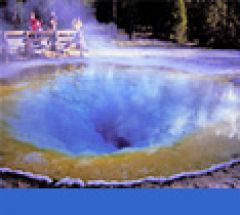Grade Level(s):
- College
Source:
- On the Cutting Edge
Resource type:
- field-based investigation
Discipline:
- Earth science
Time: Quarter-long project
Overview
This is an example of a student-driven, instructor-guided field experiments on a budget. Schools that cater to under-represented students are often those with limited resources, however, student-driven discovery in the field is an effective tool for engaging students in the natural environment and in hydrogeology. Effective strategies for addressing the special needs of urban students are included.

- [What is science?: Grades 13-16] Science works only with testable ideas.
- [What is science?: Grades 13-16] Scientists strive to test their ideas with evidence from the natural world; a hallmark of science is exposing ideas to testing.
- [What is science?: Grades 13-16] Science is ongoing; answering one scientific question frequently leads to additional questions to be investigated.
- [How science works: Grades 13-16] The process of science involves observation, exploration, testing, communication, and application.
- [How science works: Grades 13-16] Scientists test their ideas (hypotheses and theories) by figuring out what expectations are generated by an idea and making observations to find out whether those expectations are borne out.
- [How science works: Grades 13-16] Raw data must be analyzed and interpreted before we can tell whether a scientific idea is likely to be accurate or inaccurate.
- [How science works: Grades 13-16] Analysis of data usually involves putting data into a more easily accessible format (visualization, tabulation, or quantification of qualitative data).
- [Hypotheses and theories: Grades 13-16] Hypotheses are proposed explanations for a narrow set of phenomena.
- [Hypotheses and theories: Grades 13-16] Hypotheses are usually inspired and informed by previous research and/or observations. They are not guesses.
- [The social side of science: Grades 13-16] Science depends on communication within the scientific community.
- [The social side of science: Grades 13-16] Scientists usually work collaboratively.
- [The social side of science: Grades 13-16] Science relies on the accumulated knowledge of the scientific community to move forward.
- [What has science done for you lately: Grades 13-16] Advances in science often drive technological innovations, which may, in turn, contribute to new scientific discoveries.
- [What has science done for you lately: Grades 13-16] Scientific knowledge helps us make decisions that affect our lives every day.
- [What has science done for you lately: Grades 13-16] Scientific knowledge informs public policies and regulations that promote our health, safety, and environmental stewardship.
There are no NGSS/DCI concepts currently linked to this resource.
This is an example of a student-driven, instructor-guided field experiments on a budget. Schools that cater to under-represented students are often those with limited resources, however, student-driven discovery in the field is an effective tool for engaging students in the natural environment and in hydrogeology. Effective strategies for addressing the special needs of urban students are included.
